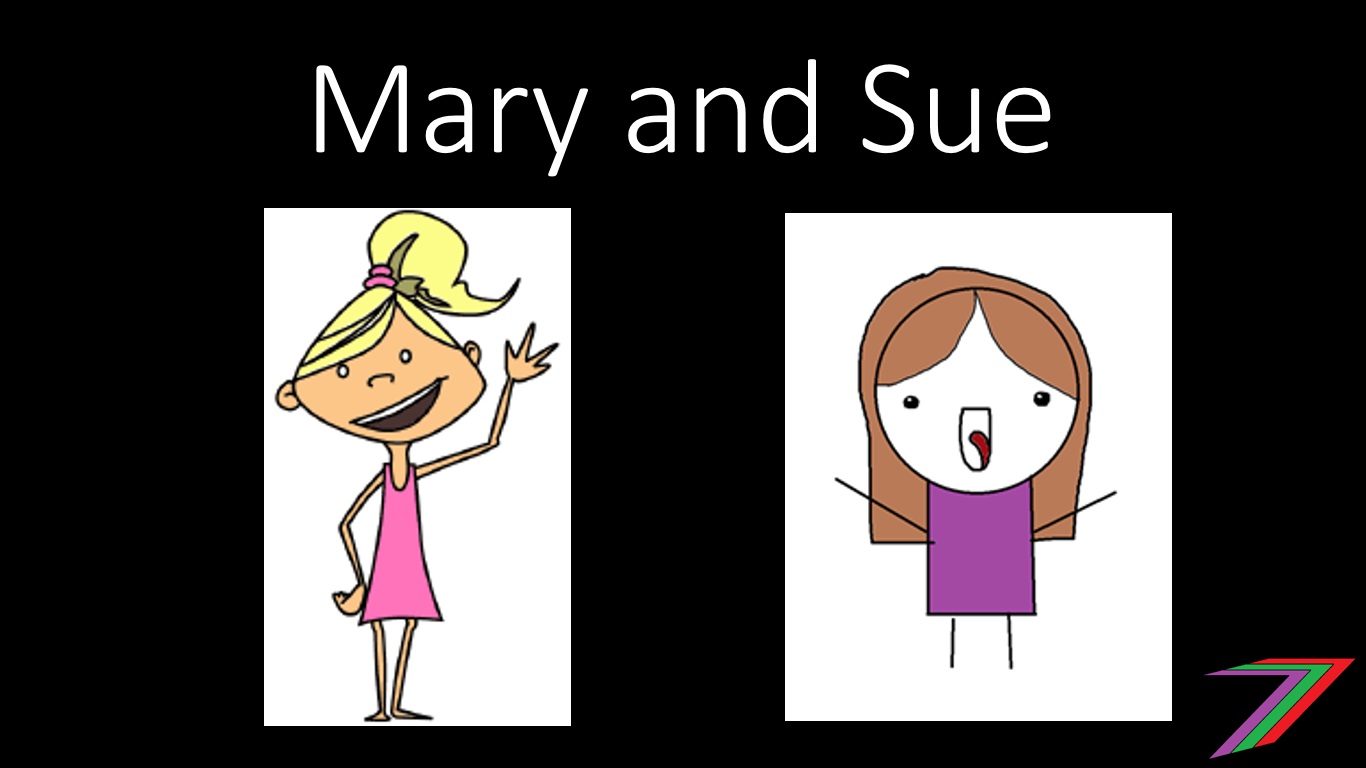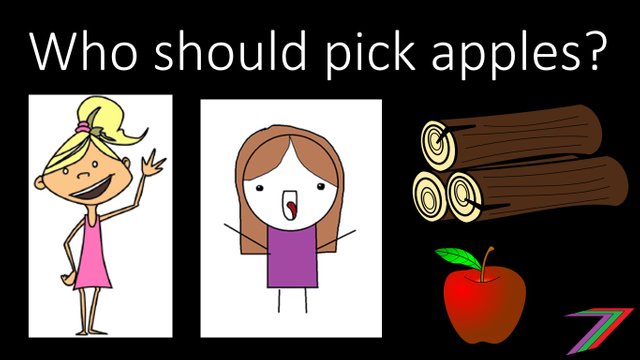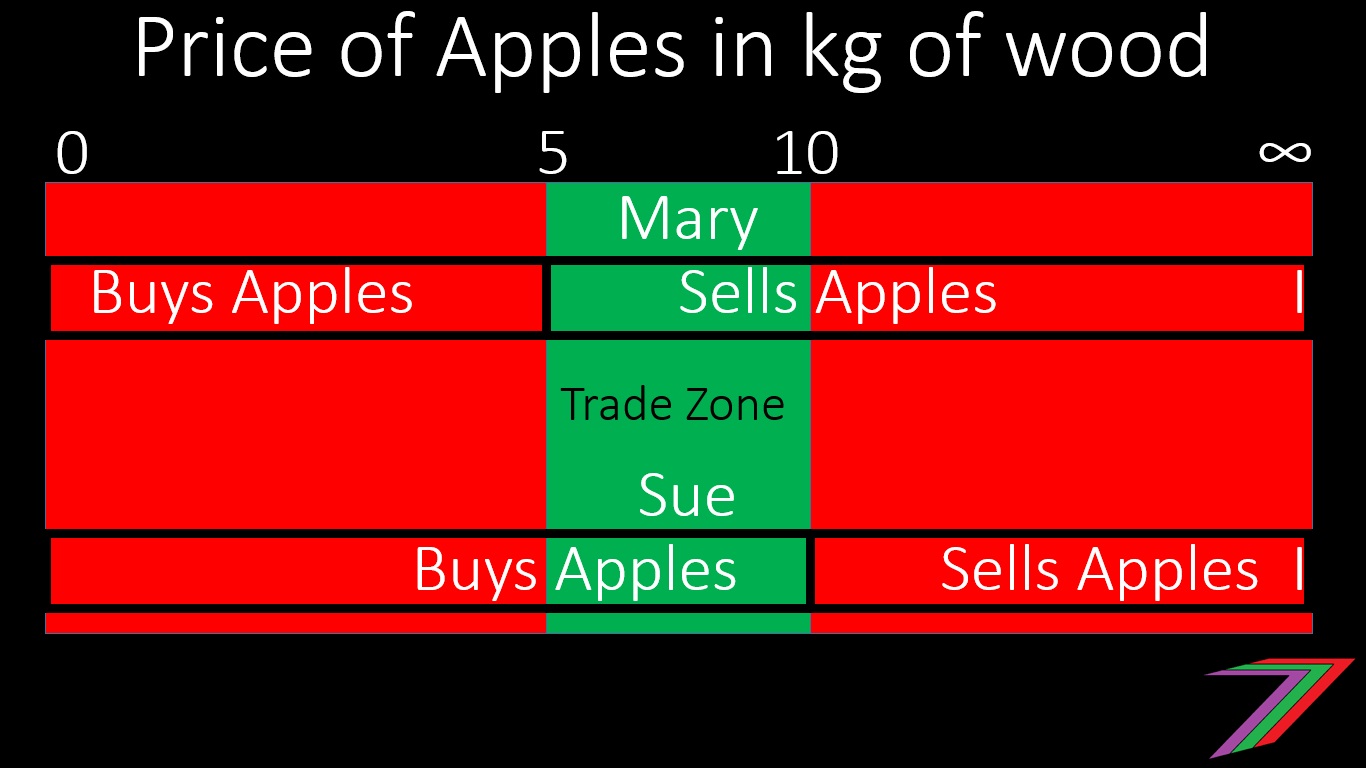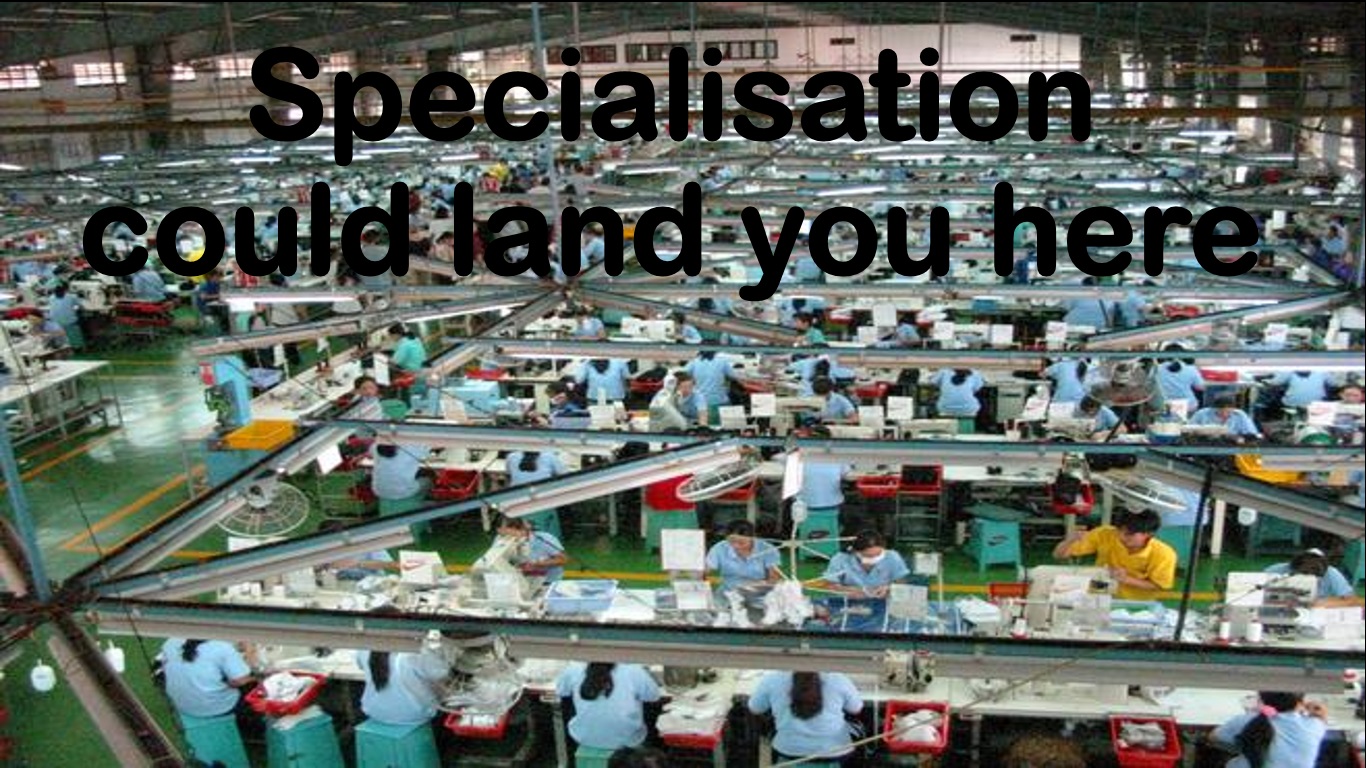
What do I mean by specialisation?
Specialisation occurs when tasks are divided up and performed by people that are relatively more proficient at performing these tasks than others. For example, a person trained as a hairdresser cuts hair rather than mows lawns for a living. In reality, people cannot always do the tasks that they are most proficient in or even trained in. For example, a person trained as a hairdresser may end up mowing lawns if there are no hairdressing jobs available.

This takes us to another concept that is closely related to specialisation and that is ‘Comparative advantage’. Comparative advantage occurs when someone is relatively better at one activity compared to somebody else.
For example, we have two people, Mary and Sue. They both have two skills, collecting wood and picking apples. If Mary dedicates an entire hour to picking apples, she can pick 20 apples. If she dedicates an entire hour to collecting wood, she can collect 100kg of wood. If Sue dedicates an entire hour to picking apples, she can pick 8 apples. If she dedicates an entire hour to collecting wood, she can collect 80kg of wood. Mary is more efficient at picking apples and collecting wood than Sue. Mary has an absolute advantage over Sue but that does not mean she has a comparative advantage.

Can specialisation still take place? If so, what should Mary and Sue specialise in. For every apple Mary picks, she could have collected 5kg of wood. For every 10kg of wood Mary collects, she could have picked 2 (20/(100/10) apples. For every apple Mary picks, she could have collected 5kg (100kg/20) of wood. For every apple Sue picks, she could have collected 10kg (80kg/8) of wood. For every 10kg of wood Mary collects, she could have picked 1 (8/(80/10) apple. Sue has a comparative advantage of collecting wood over Mary but Mary has a comparative advantage of picking apples.
Who should pick apples?

Based on comparative advantage, Mary should specialise in picking apples and Sue should specialise in collecting wood. Let’s see if specialisation works using comparative advantage. Let’s say the girls work for 8 hours.
Scenario 1
If Mary picks apples for eight hours and Sue collects wood for eight hours, how many apples and how much wood do we have?
Mary would pick 160 apples and Sue would collect 640kg of wood.
Scenario 2
What if Sue picks apples for eight hours and Mary collects wood for eight hours, how many apples and how much wood do we have?
Sue would pick 64 apples and Mary would collect 800kg of wood.
Scenario 3
What if Mary spends four picking apples and four hours collecting wood and Sue does the same, how many apples and how much wood do we have?
Mary would pick 80 apples and Sue would pick 32 apples and Mary would collect 400Kg of wood and Sue would collect 320kg of wood. We would have a total of 112 apples and 720kg of wood.
Has specialisation using comparative advantage paid off?
It is not immediately obvious from the numbers produced as we are comparing apples with wood. What if apples and wood could be traded, would that make it clearer if specialisation through comparative advantage works. For Mary, effort to collect 1 apple is equivalent to effort to collect 5kg of wood and for Sue, effort to collect 1 apple is equivalent to effort to collect 10kg of wood. Mary would therefore trade 1 apple if she could receive more than 5kg of wood. Sue would trade 10kg of wood if she could receive more than 1 apple. If 1 apple could be traded for between 5kg and 10kg of wood, Mary would trade all her apples and Sue would trade all her wood. Let’s assume that 1 apple can be traded for 7.5kg of wood.

Scenario 1
Mary trades 160 apples for 1200kg of wood and Sue trades 640kg of wood for 85 1/3 apples.
Scenario 2
No trades are made, Mary has 800kg of wood and Sue has 64 apples.
Scenario 3
Mary trades 80 apples for 600kg of wood, she has a total of 1000kg (400kg collected by herself) of wood. Sue trades 320kg of wood for 42 2/3 apples, she has a total of 74 2/3 apples (32 apples collected by herself).

It is now apparent that specialisation using comparative advantage can result in higher output if trade is possible. That is if the 1 apple can be traded for between 5kg and 10kg. If apples trade for less than 5kg both Mary and Sue will only collect wood. If apples trade for more than 10kg both Mary and Sue will only pick apples. Specialisation is still taking place but it is other people with greater comparative advantage for either picking apples or collecting wood that are influencing the price.
In the real world
Specialisation occurs all the time in the real world. It can be between business, people, and even countries. Specialisation through competitive advantage is a good method of producing the highest output. This does not mean that specialisation produces the highest amount of satisfaction or utility.
People with adequate resources and/or support are able to learn new skills that can give themselves both a comparative advantage as well as an absolute advantage altogether. There are others that are less fortunate and are born into an environment where comparative advantage lies in production that requires low cost labour.

Specialisation can be a doubled-edged sword. If done correctly, production output and efficiency are improved. On the flipside, pressure to follow a fixed specialised path can be quite a restriction on your own freedom. This is especially so if specialisation is forced upon you. Aldous Huxley’s ‘Brave New World’ is an example of where specialisation and compartmentalisation have gone mad; this can make life unbearable for many.

Conclusion
This has been a mostly theoretical post. I have outlined what is meant by specialisation and how comparative advantage can be used to enhance specialisation. I have explained that through specialisation output can be increased and efficiency of production can be improved. I could elaborate further on how specialisation can help shift the production possibility frontier (PPF). I decided that should be left to another post.
Specialisation can work well in regards to increasing output (most likely in the short-run); it is also possible that specialisation could reduce moral and eventually reduce output. Specialisation, though, does not work so well for those that are trapped and are unable to acquire the skills they want to be able to have greater freedom.
I hope you enjoyed this post. I have several more economic concepts that I will be explaining in posts to come.








Great post again, Spectrum! I hope you don't mind if I contribute a few thoughts of my own, all of which are :
There is no doubt that, in the overall aggregate, the benefits of specialization and trade have far outweighed the costs... but this does not mean that there aren't costs to watch out for all the same.
There are, then, three potential downsides of which we must remain weary:
Mechanization. OP already introduced the idea that by specializing in the same, overly-repetitive action, we can specialize ourselves into a boring, if not miserable existence.
Over-specialization. Specialization is a process in which larger tasks tend to be broken down into smaller ones. The smaller and more specialized the task becomes, however, the more likely is it to be replaced by a machine. As such, there is a threat that I will dedicate my life to specializing in X, just to have my job replaced by a machine, at which point I am no longer qualified to "specialize" in any other paid job.
Division of Responsibility. The division of labor necessarily brings with it a division of knowledge and a division of social/moral responsibility. For example, Europeans in the 19th century could easily condemn New World slavery as barbaric while at the same time supporting that institution through their purchasing decisions. Indeed, since low-cost, slave labor had pretty much put all competition out of business in some markets, the European consumers had little option but to support New World slavery. Specialization does not necessarily create these contradictions, but it does make them harder to identify and eradicate.
Downvoting a post can decrease pending rewards and make it less visible. Common reasons:
Submit
Hi @paradigms.lost, I upvoted this comment as part of my Good Comment Initiative. I love that you engaged with the content of the original poster and added further food for thought, sparking some nice Steemit interaction here in the comments.
I am trying to support great commenters like yourself and encourage others to take the time to leave honest thoughtful comments. If you agree to let me quote some or all of your comment, it may be featured in an upcoming post as an example of great commenting. Please reply to let me know if you approve of this use of your terrific comment :) Cheers - R-bot
Downvoting a post can decrease pending rewards and make it less visible. Common reasons:
Submit
@r-bot, that's perfectly fine with me. Anything to get the dialogue going!
Downvoting a post can decrease pending rewards and make it less visible. Common reasons:
Submit
Thanks for that @paradigms.lost. You make a quite a few really good points in your response. The risks and downsides to specialisation mostly fall on the side of the specialised individuals rather than the producers themselves. This is probably why specialisation is still so strongly promoted.
There is also a difference in the type of specialisation. Specialisation in tasks that are repetitive and require very little cognitive thought process are likely to be boring, unsatisfying, and at risk of replacement by machine. This type of specialisation is also likely to be exploited in countries that have low-cost/slave labour.
There is also specialisation in jobs such as academia and science. Jobs that require skills that cannot be easily replicated by machines and are also mentally stimulating. These types of jobs benefit from specialisation. Even these jobs can cause isolation from the real world and create the problem of ivory tower syndrome. It can be easy to get too wrapped up in a particular area of specialisation and lose track of the bigger picture.
Downvoting a post can decrease pending rewards and make it less visible. Common reasons:
Submit
You're exactly right about the isolation from others in the world. We just need to be careful that we don't give the threat of isolation carte blanche since that is the bread and butter of Marxists.
Downvoting a post can decrease pending rewards and make it less visible. Common reasons:
Submit
Great post! As someone who has resisted specialization in my own life I found it fascinating.
I think for many businesses specialization in job roles within the organization is the easy way out, but not necessarily the best. Compartmentalizing every thing certainly makes training a new replacement piece easier, but organizations that cross-train their employees realize benefits not just in moral but in productivity as employees better understand the whole system.
And I think the necessary specialization in academia actually results in interesting situations where a problem in one field may well have been solved in another field but the inter-disclipinary communication and cooperation necessary to realize this is lacking.
I am glad you commented on my @humanbot Human Certified Original Works post, you are a great poster! Happy to follow you :) Cheers - Carl
Downvoting a post can decrease pending rewards and make it less visible. Common reasons:
Submit
Thanks @carlgnash. I think it can be a great advantage to have knowledge of what is happening in other other fields rather than just to be isolated to your own discipline. That is one of the reasons I enjoy economics. Economics feds off of so many different areas.
The @humanbot project sounds very exciting. I am happy to be part of it.
Downvoting a post can decrease pending rewards and make it less visible. Common reasons:
Submit
good post.
Downvoting a post can decrease pending rewards and make it less visible. Common reasons:
Submit
Thanks @rana420. I'm glad you enjoyed reading it.
Downvoting a post can decrease pending rewards and make it less visible. Common reasons:
Submit
Great real world examples to help understand the concept.
thanks.
Downvoting a post can decrease pending rewards and make it less visible. Common reasons:
Submit
No problem @jmcmeekin, I'm glad you enjoyed it.
Downvoting a post can decrease pending rewards and make it less visible. Common reasons:
Submit
This post has received a 16.86 % upvote from @buildawhale thanks to: @spectrumecons. Send at least 1 SBD to @buildawhale with a post link in the memo field for a portion of the next vote.
To support our daily curation initiative, please vote on my owner, @themarkymark, as a Steem Witness
Downvoting a post can decrease pending rewards and make it less visible. Common reasons:
Submit
@originalworks
Downvoting a post can decrease pending rewards and make it less visible. Common reasons:
Submit
This post has received a 23.09 % upvote from @boomerang thanks to: @spectrumecons
@boomerang distributes 100% of the SBD and up to 80% of the Curation Rewards to STEEM POWER Delegators. If you want to bid for votes or want to delegate SP please read the @boomerang whitepaper.
Downvoting a post can decrease pending rewards and make it less visible. Common reasons:
Submit
@carlgnash from the @humanbot Human Certified Original Works Initiative has manually determined this post to be the original work of the post author. To learn more about this certification visit the Badge of Originality genesis post:
https://steemit.com/art/@carlgnash/the-badge-of-originality-human-certified-original-works
Thanks for being an original content creator! You rock!
Downvoting a post can decrease pending rewards and make it less visible. Common reasons:
Submit
Your post had been curated by the @buildawhale team and mentioned here:
https://steemit.com/buildawhale/@buildawhale/buildawhale-curation-digest-11-13-17
You have received an upvote by @officialfuzzy thanks to @akrid and Whaleshares.
Keep up the good work and original content, everyone appreciates it!
Downvoting a post can decrease pending rewards and make it less visible. Common reasons:
Submit